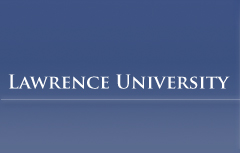Document Type
Press Release
Publication Date
12-9-2003
Abstract
The impact of the exploding non-native zebra mussel population on the ecosystem of the bay of Green Bay will be the focus of a three-year study conducted by Lawrence University associate professor of biology Bart De Stasio starting in March 2005. The research project will be funded by a $206,000 grant De Stasio was awarded by the University of Wisconsin Sea Grant Program.
A specialist in aquatic biology, especially predator-prey interactions, De Stasio will combine advanced computer modeling with field study research to determine the effects the exotic invader is having in Green Bay on the populations of phytoplankton, benthos, zooplankton and fish species.
Widely considered one of the most productive fisheries in the Great Lakes, Green Bay had been studied extensively prior to the invasion by zebra mussels. But De Stasio’s study will be the first to explore the dramatic changes the coastal ecosystem of Green Bay has undergone since zebra mussels were first discovered there in 1992 and only the third of its kind on the entire Great Lakes basin.
The research project will have three main objectives. One will be to identify information gaps in existing data by conducting field studies on key components of the lower food web at sites that were investigated extensively prior to the zebra mussel invasion as well as analyzing unpublished data from that time period.
The research project will have three main objectives. One will be to identify information gaps in existing data by conducting field studies on key components of the lower food web at sites that were investigated extensively prior to the zebra mussel invasion as well as analyzing unpublished data from that time period.
The study’s third objective will involve the construction of a dynamic energy/mass balance-flow ecosystem model of Green Bay that can be used for comparison with current modeling efforts done for the Bay of Quinte on Lake Ontario and Oneida Lake in New York.
“Green Bay is an ideal site for this project because of the abundance of good data that had been collected by other scientists and researchers prior to the arrival of the zebra mussel,” De Stasio said. “This study will provide a great opportunity to collect new data and create ecosystems models that will be invaluable to others who are also studying this problem. We want to establish collaborations with researchers at Cornell University and the Ontario Ministry of Natural Resources so we can determine the impact the zebra mussel is having on similar ecosystems not just in northeast Wisconsin but throughout the entire Great Lakes region.”
The grant will enable two Lawrence students to join De Statio as technicians and summer research assistants each year of the study as well as support one graduate student at UW-Green Bay.
With the support of a 1995 National Science Foundation grant, De Stasio previously established a baseline data set for ecological and genetic dynamics to measure the impact of zebra mussels on the Lake Winnebago watershed.
Native to the Caspian Sea region of Asia, the fingernail-sized zebra mussels are believed to have arrived in the Great Lakes via ballast water discharged from a transoceanic vessel into Lake St. Clair, near Detroit in 1988. Since their discovery, they have spread rapidly to all of the Great Lakes and waterways in many states, as well as Ontario and Quebec. By 1998, they had reached Lake Winnebago.
While most of the biological impacts of zebra mussels in North America are not yet known, information from Europe suggests zebra mussels have the potential to severely impact native mussels by interfering with their feeding, growth, locomotion, respiration and reproduction. They are notorious for their capabilities to colonize water supply pipes of power plants, public water supply plants and other industrial facilities, constricting flow and reducing the intake capacity in heat exchangers, condensers, fire fighting equipment and air conditioning and cooling systems.
A 1982 Lawrence graduate, De Stasio earned his Ph.D. in ecology and evolutionary biology at Cornell University. He joined the Lawrence biology department in 1992 and was named a recipient of the Appleton Joint Rotary Clubs’ 1998 “Cutting Edge” award for leadership and innovation in education.
Department
Biology
Recommended Citation
Lawrence University, "Lawrence University Biologist Awarded $200,000 Grant for Zebra Mussel Study" (2003). Press Releases. 268.
https://lux.lawrence.edu/pressreleases/268
